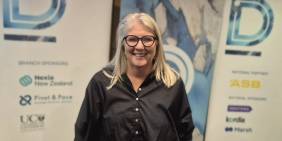
A biotech pioneer translating science into business

Maxine Simmons CMInstD loves working with scientists and translating what great innovators have to say into business language.
The founder of one of New Zealand’s first biotechnology companies, and with a governance career spanning more than 30 years, Simmons says she is attracted to boards based on their “technology and people”.
“What I enjoy most about governance is bringing about great technology and that there are people wanting to buy it and use it. I love that rationale – technology must be novel and based on sound science and it must be interesting – because if it isn’t interesting and no-one wants to buy it then it’s not much use to anyone beyond an article in an obscure journal.”
Simmons, who recently completed the IoD’s Advanced Directors’ Course, has held many influential roles in science commercialisation and early-stage biotechnology company development. She is a Companion of the New Zealand Order of Merit for her services to science, particularly biotechnology.
She says innovation is based on new ways of thinking and even in a successful business, nothing stays the same.
“You must be able to anticipate what is going to change and make sure the company is current. I like to challenge the status quo. Where you are as a company will not be where you are in a year from now. You must be able to respond and be adaptive.”
She enjoys working with boards that are open to ideas and recognise that none of us know everything. “One of the things that makes a good director is being able to listen to different points of view. We need to be able to have a good debate and be respectful of others’ opinions.
“I firmly believe all ideas are good, the power of ideas is very strong. As a board you need to take ideas and think about them and then come back. Being open to different ideas is the source of innovation and good decision-making.
“I don’t mind if they don’t act on what I suggest, but if they are prepared to listen and consider, and are open and interested in technology, then I want to help.”
“I was on the Advisory Board for Technology for Business Growth and the only biologist. It was me and about 10 male engineers. I remember thinking, ‘they think very differently to me, they are very linear’.”
Simmons was raised “in an entrepreneurial family” so didn’t regard setting up her own business, as a young MSc graduate, as unusual. That grew into a successful export business and she subsequently also set up and is a director of BioCatalyst, a biotechnology consulting company.
Interacting with her own board – her chair of that first company was former minister of finance Ruth Richardson – was her introduction to governance. However, as women scientists successfully building an innovative export business, she and her co-founder soon attracted the attention of government.
“The government was very supportive of having scientists involved in governance and were pushing for more women and more diversity,” she says.
“I have always had a passion for innovation and science, so one of my first governance appointments was as a director of the Foundation for Research Science and Technology. That was under the then Ministry of Science and was the funder of New Zealand science.
“I joined the board of Industrial Research Ltd, one of the Crown Research Institutes, which ultimately became Callaghan Innovation. I was also on the foundation board of Industry New Zealand, which merged with Trade New Zealand to become the current New Zealand Trade and Enterprise. That was a fascinating role.”
Simmons generally found she was the youngest member of a board and one of few women.
“I was on the Advisory Board for Technology for Business Growth and the only biologist. It was me and about 10 male engineers. I remember thinking, ‘they think very differently to me, they are very linear’. That was a revelation; that people thought in such different ways. But different ways of thinking is how you get innovation.
“I discovered I could cope with that and interact with people who think differently and that I enjoyed translating what great innovators have to say into business language. I also enjoy working for the best outcomes, so that’s how it all started.”
“It is complex technology and right up my alley because I did my training in immuno-chemistry – so antigen antibody interaction.”
She remains passionate about getting the best outcomes in governance, particularly focused on science commercialisation and early-stage biotechnology company development.
Roles over the years have also included chair of NZBIO, a New Zealand representative on the APEC Business Advisory Council (ABAC), and executive director of Cure Kids Ventures, a seed and early-stage healthtech company investment fund.
She is also involved with diagnostic companies Pictor, as the chair, and IGENZ (director). Pictor is an in-vitro diagnostics company that offers a patented multiplexed platform for highly accurate and efficient testing of complex and infectious diseases for human and animal health.
This year, the company launched a ground-breaking test for the Mycoplasma bovis (m.bovis) cattle disease which was detected in New Zealand in 2017. The test, now available globally, may allow for the elimination of individual animals rather than entire herds, significantly reducing the impact of the disease on farm businesses.
Simmons has led the board in enabling the company to pivot to new markets, drive investor fundraising, evolve into a slimmer operating model, and position it for future growth and expansion.
“It is complex technology and right up my alley because I did my training in immuno-chemistry – so antigen antibody interaction. Pictor is right in that space.
“It is making it more accessible in the area where people are looking to detect lots of biomarkers and get more information about disease, and doing it through markers in blood and saliva to quickly detect disease and infection.”
“We need to start new ventures. I understand why people might not be attracted to that, but . . . perhaps we are not embracing innovation as much, or keeping it current and fostering innovation.”
However, she says participating in governance for innovative science-based technology “isn’t for the faint-hearted”.
“I must be very confident about the technology and the role I can play in transforming the way diagnostics are delivered. It isn’t easy to get the right team, in the right place at the right time,” she says.
“It is a heavily regulated industry, so it takes a long time to get to the stage where you have met all the regulatory requirements, and it is not easy to get funding pre-commercialisation.
“You can’t do that all within New Zealand, so it has been an interesting journey to internationalise the Pictor board. We have board members from the UK and US, too, and our managing director is from the US.”
IGENZ is a privately owned, accredited clinical laboratory delivering innovative diagnostic genomics services. “The two scientist founders needed to scale up their laboratory side,” she says. “I love working with scientists and I’m enjoying helping them with the early business discipline.”
Simmons does worry that, to a degree, New Zealand may have taken its foot off the pedal in new thinking and acting on innovative ideas, and would like to see more advanced directors involved in early- stage companies.
“We need to start new ventures. I understand why people might not be attracted to that, but looking back at my connection with the science community, from a New Zealand perspective, perhaps we are not embracing innovation as much, or keeping it current and fostering innovation. I think we have slightly lost our way and that worries me.”
If you are interested in knowing more about the Advanced Directors’ Course, and whether this development opportunity is right for you, contact our team on 0800 846 369.


